How to Promote Logistics Enterprises to Participate in Reverse Emergency Logistics: A Tripartite Evolutionary Game Analysis
Abstract
1. Introduction
1.1. Background
1.2. Involving Logistics Enterprises and Environmental NGOs
2. Literature Review
2.1. Emergency Logistics and Reverse Emergency Logistics
2.2. Evolutionary Game Theory
3. The Model
3.1. Problem Formulations
3.2. Basic Assumptions of the Model
3.2.1. Strategy Selection of Players
- (1)
- This study proposes the government can choose two strategies: “reward-punishment” and “no reward-punishment”. “Reward-punishment” refers to the government actively providing awards to logistics enterprises and environmental NGOs that actively participated in the takeback and recycling processes, and leveraging taxes to punish the logistics enterprises that do not participate in recycling. “No reward-punishment” refers to the government taking no action in recycling processes. As a result, it will pay certain costs.
- (2)
- The strategies of logistics enterprises are divided into “participation” and “non-participation”. “Participation” indicates enterprises which actively participate in the reverse logistics of emergency relief. “Non-participation” refers to logistics enterprises which only conduct regular takeback and recycling instead of emergency recycling, and they need to pay the taxes levied by the “reward-punishment” government.
- (3)
- Environmental NGOs’ strategies include “participation” and “non-participation”. “Participation” refers to fully independent third-party environmental NGOs which actively supervise the engagement of the government and logistics enterprises in the recycling processes and query the “no reward-punishment” government and “non-participation” logistics enterprises through public opinion and public interest litigation. “Non-participation” refers to the organizations which take no action in emergency recycling.
3.2.2. Assumptions of Players
3.2.3. Income Matrix
3.3. Establishment of the Tripartite Evolutionary Game Model
4. Analysis of Evolutionary Stable Strategy (ESS)
4.1. ESS Analysis of Game Players
- (1)
- If y < y*, then and , which means the evolutionary stable point is x = 1, which indicates that when the probability of logistics enterprises implementing reverse logistics is low, the government tends to choose the “reward-punishment” strategy considering the increased burden of emergency follow-up work.
- (2)
- If y > y*, then and , which means the evolutionary stable point is x = 0, which indicates that when the probability of logistics enterprises choosing the “participation” strategy is high, then even without government subsidies, logistics enterprises will actively take the takeback and recycling affairs; then, the government tends to choose the “no reward-punishment” strategy.
- (1)
- If z < z*, then and , which means the evolutionary stable point is y = 0, which indicates that when the probability of environmental NGOs to choose the “participation” strategy is low, logistics enterprises will not bear the indirect costs caused by NGOs’ supervision and will gain benefits through regular recycling affairs. Considering emergency risks and uncertainties, the cost of emergency recycling processes is uncertain, and enterprises are unable to confirm whether the cost will be covered by benefits or not. Therefore, logistics enterprises tend to choose the “non-participation” strategy.
- (2)
- If z > z*, then and , which means the evolutionary stable point is y = 1, which indicates that when the probability of environmental NGOs to choose the “participation” strategy is high, logistics enterprises will bear the indirect cost caused by NGOs’ supervision, if they choose the ‘non- participation’ strategy. Then, the cost is expected to be larger than its benefits. After that, logistics enterprises tend to choose the ‘implement’ strategy.
- (1)
- If x < x*, then and , which means the evolutionary stable point is z = 0, which indicates that when the probability of government choosing the “reward-punishment” strategy is low, environmental NGOs cannot receive government subsidies and supervision cost cannot be covered by the benefits considering emergency risks. Therefore, environment NGOs will choose the ‘non-participation’ strategy.
- (2)
- If x > x*, then and , which means the evolutionary stable point is z = 1, which indicates that when the probability of government choosing the “reward-punishment” strategy is high, environmental NGOs can receive government subsidies and its supervision costs can be covered by its benefits considering emergency risks. Therefore, environmental NGOs will choose the “participation” strategy.
4.2. ESS Analysis of Three-Party Evolutionary Game
4.2.1. ESS Analysis of the Government and Logistics Enterprises
4.2.2. ESS Analysis of the Government and Environmental NGOs
5. Data Simulation
5.1. Impact of Government and Environmental NGOs’ Participation on the Strategic Selection of Logistics Enterprises
5.2. Impact of Environmental NGOs’ Intervention on Logistics Enterprises in the Context of “Government Failure”
5.3. The Mutual Impact of the Governmental and Environmental NGOs’ Strategy Choice
5.3.1. The Impact of Environmental NGOs’ Supervision on the Government’s Strategy Choice
5.3.2. The Impact of the Government’s Support on Environmental NGOs’ Strategy Choice
6. Conclusions and Recommendations
6.1. Conclusions
6.2. Recommendation
- (1)
- The emergency risk can significantly influence the strategy choice of logistics enterprises. The emergency risk leads to the additional costs of logistics enterprises, and with the increase of it, the probability of enterprises implementing emergency reverse logistics decreases gradually. In this situation, logistics enterprises are unwilling to participate in the emergency recycling processes without sufficient external help. Therefore, in order to promote logistics enterprises’ participation, the government must play the full role of regulation and guidance in different ways. On the one hand, the government could set rewards and compensate enterprises’ losses incurred by emergency risk during the recycling processes. On the other hand, the government could also set punishments to increase the pressure on those passive logistics enterprises.
- (2)
- It is necessary for environmental NGOs to be involved in the emergency recycling mechanism. In this study, we found that the intervention of environmental NGOs is able to support government to improve logistics enterprises’ participation more efficiently and effectively. More important, though the government does mainly promote logistics enterprises to fulfill the main recycling affairs, “Government Failure” which reduces the effect of the regulation and guidance for logistics enterprises cannot be ignored. Environmental NGOs’ intervention is capable of complementing the government’s defects to promote logistics enterprises’ participation under the various degrees of “Government Failure”. Furthermore, the potential losses caused by NGOs’ supervision measures plays a crucial role in the government’s strategy selection.
- (3)
- The uncertainties brought about by emergency situations and other game players’ unpredictable behaviors can also impact the strategy choice of environmental NGOs. The uncertainty brings about additional costs to NGOs. Additionally, it is almost impossible for NGOs to involve into the emergency recycling mechanism under high uncertainties. According to the research results, with the financial support of the government, environmental NGOs are competent in performing supervisory duties better. Thus, the government ought to consider the long-term social and economic benefits of environmental NGOs and consider providing them with subsidies to overcome the negative influence of uncertainties during recycling processes.
Author Contributions
Funding
Institutional Review Board Statement
Informed Consent Statement
Data Availability Statement
Conflicts of Interest
References
- Li, W.; Wang, Y.; Zhang, P. Research Progress on the Characteristics and System Construction of China’s Health Emergency Work. Chin. J. Health Emerg. 2016, 2, 370–374. [Google Scholar]
- Zhang, Y.; Khan, S.A.R. Evolutionary game analysis of green agricultural product supply chain financing system: COVID-19 pandemic. Int. J. Logist. 2021, 25, 1115–1135. [Google Scholar]
- Wang, X.Z. Track of Residule Drugs and Materials of Xiaotangshan Hospital during SARS. China Econ. Wkly. 2009, 42, 13–15. [Google Scholar]
- Zhou, Q.S.; Olsen, T.L. Inventory rotation of medical supplies for emergency response. Eur. J. Oper. Res. 2017, 257, 810–821. [Google Scholar] [CrossRef]
- Liu, J. Research on Preparation and Scheduling System of Supplies in Major Emergencies 2015. Ph.D. Thesis, Wuhan University of Technology, Wuhan, China, 2015. [Google Scholar]
- Li, T.; Chang, J. The compound failure, evolution logic and crack path of “one master and Multiple” cooperation model—Based on the investigation of T City’s municipal solid waste classification and recycling project. Theor. Explor. 2020, 3, 76–85. [Google Scholar]
- Li, P.L. The Reform and the Future of China’s Social Organization System. Chin. J. Sociol. 2013, 33, 1–10. [Google Scholar]
- Spicer, A.; Johnson, M. Third-party demanufacturing as a solution for extended producer responsibility. J. Clean. Prod. 2004, 12, 37–45. [Google Scholar] [CrossRef]
- Chen, Z.-S.; Zhang, X.; Govindan, K.; Wang, X.-J.; Chin, K.-S. Third-party reverse logistics provider selection: A computational semantic analysis-based multi-perspective multi-attribute decision-making approach. Expert Syst. Appl. 2020, 166, 114051. [Google Scholar] [CrossRef]
- Wei, J.; Wei, H. A Study on the Reclaim Cooperation with the Third-party Reverse Logistics Enterprise. J. Syst. Manag. 2011, 20, 702–709. [Google Scholar]
- Li, C.L.; Hu, B.Q. China’s Environmental Emergency Response System and Suggestions. Environ. Prot. 2020, 48, 34–39. [Google Scholar]
- Yang, C.F.; Liu, Q.Q.; Shuang, H.J. Analysis of Causes of Government Failure and Countermeasures. Product. Res. 2009, 8–11. [Google Scholar] [CrossRef]
- Gray, R.; Bebbington, J.; Collison, D. NGOs, civil society and accountability: Making the people accountable to capital. Account. Audit. Account. J. 2006, 19, 319–348. [Google Scholar] [CrossRef]
- Bendell, J. A no win–win situation?: GMOs, NGOs and sustainable development. In Terms for Endearment: Business, NGOs and Sustainable Development; Routledge: London, UK, 2013; pp. 96–110. [Google Scholar] [CrossRef]
- Gourevitch, P.A.; Lake, D.A.; Stein, J.G. The Credibility of Transnational NGOs: When Virtue is not Enough; Cambridge University Press: Cambridge, UK, 2012; pp. 1–234. [Google Scholar]
- Tan, L.; Fan, F.; Zhang, W.; Zhang, T. An Empirical Study on the Development Level and Spatial-Temporal Differences of China’s Nonprofit Organizations: Based on 20-Year Panel Data from 31 Provincial-Level Divisions. In Proceedings of the International Conference on Management Science and Engineering Management, Toledo, Spain, 1–4 August 2021; Springer: Cham, Switzerland, 2021; pp. 146–160. [Google Scholar] [CrossRef]
- Wang, Z.; Chen, G. Evolutionary game analysis of linkage development between manufacturing industry and logistics industry. China Econ. Stud. 2012, 2, 86–97. [Google Scholar]
- Tian, Y.; Govindan, K.; Zhu, Q. A system dynamics model based on evolutionary game theory for green supply chain management diffusion among Chinese manufacturers. J. Clean. Prod. 2014, 80, 96–105. [Google Scholar] [CrossRef]
- Cai, G.; Kock, N. An evolutionary game theoretic perspective on e-collaboration: The collaboration effort and media relativeness. Eur. J. Oper. Res. 2009, 194, 821–833. [Google Scholar] [CrossRef]
- Fiedrich, F.; Gehbauer, F.; Rickers, U. Optimized resource allocation for emergency response after earthquake disasters. Saf. Sci. 2000, 35, 41–57. [Google Scholar] [CrossRef]
- Chen, G.; Zhang, J.; Fu, J. Multi-objective Emergency Logistics Location Allocation Model in Uncertain Environment. Chin. J. Saf. Sci. 2016, 12, 163–168. [Google Scholar]
- Guo, J.; Wang, C. A Study on Optimization of Emergency Logistics Path in Complex Waters Based on Improved Dijkstra Algorithm. In Proceedings of the 2020 13th International Conference on Intelligent Computation Technology and Automation (ICICTA), Xi’an, China, 24–25 October 2020; pp. 23–28. [Google Scholar] [CrossRef]
- Zhang, G.S. Modeling and simulation on dynamic collaborative decision-making optimization of emergency materials scheduling and transportation. J. Saf. Sci. Technol. 2020, 16, 164–169. [Google Scholar]
- Bodaghi, B.; Palaneeswaran, E.; Shahparvari, S.; Mohammadi, M. Probabilistic allocation and scheduling of multiple resources for emergency operations; a Victorian bushfire case study. Comput. Environ. Urban Syst. 2020, 81, 101479. [Google Scholar] [CrossRef]
- Balcik, B.; Beamon, B.M. Facility Location in Humanitarian Relief. Int. J. Logist. Res. Appl. 2008, 11, 101–121. [Google Scholar] [CrossRef]
- Jeong, K.Y.; Hong, J.D.; Xie, Y. Design of emergency logistics networks, taking efficiency, risk and robustness into consideration. Int. J. Logist. Res. Appl. 2014, 17, 1–22. [Google Scholar] [CrossRef]
- Lu, Y.; Wu, D.; Zhou, L. Research of Emergency Information Resourse Organization Based on Metadata. In Proceedings of the 2016 International Conference on Education, Management, Computer and Society, Shenyang, China, 1–3 January 2016. [Google Scholar] [CrossRef][Green Version]
- Yu, D.; Gao, L.; Zhao, S. Location-allocation Optimization Model for Emergency Facilities and Algorithm with Maximum Time Satisfaction. Syst. Eng. 2018, 36, 99–106. [Google Scholar]
- Zhang, X.; Su, Y.; Yuan, X. Government Reward-Penalty Mechanism in Closed-Loop Supply Chain Based on Dynamics Game Theory. Discret. Dyn. Nat. Soc. 2018, 2018, 3541823. [Google Scholar] [CrossRef]
- Liu, M.; Cao, J. Dynamic adjustment method for optimizing epidemic-logistics network based on data-driven. Syst. Eng.-Theory Pract. 2020, 40, 437–448. [Google Scholar]
- Pettit, S.J.; Beresford, A.K. Emergency Relief Logistics: An Evaluation of Military, non-Military and Composite Response Models. Int. J. Logist. Res. Appl. 2005, 8, 313–331. [Google Scholar] [CrossRef]
- Hu, J.; Liu, A. Research on resilience of emergency logistics network responding to public health emergencies based on system dynamics. J. Inf. Comput. Sci. 2015, 12, 1001–1010. [Google Scholar]
- L’Hermitte, C.; Nair, N.C. A blockchain-enabled framework for sharing logistics resources during emergency operations. Disasters 2020, 45, 527–554. [Google Scholar] [CrossRef] [PubMed]
- Peterson, M.M.R.; Young, R.R.; Gordon, M.G.A. The application of supply chain management principles to emergency management logistics: An empirical study. J. Emerg. Manag. 2016, 14, 245–258. [Google Scholar] [CrossRef]
- Guo, J.B.; Yang, Y.; Kun-Peng, Y.; Zhang, X.F. Establishment of decision-making model for emergency reverse logistics based on system dynamics. Appl. Res. Comput. 2013, 30, 1979–1982. [Google Scholar]
- Hu, Z.-H.; Sheu, J.-B. Post-disaster debris reverse logistics management under psychological cost minimization. Transp. Res. Part B-Methodol. 2013, 55, 118–141. [Google Scholar] [CrossRef]
- Mei, X.; Hao, H.; Sun, Y.; Wang, X.; Zhou, Y. Optimization of medical waste recycling network considering disposal capacity bottlenecks under a novel coronavirus pneumonia outbreak. Environ. Sci. Pollut. Res. 2021, 1–19. [Google Scholar] [CrossRef] [PubMed]
- Wang, Y.; Xu, D.; Nong, L. Research of location-routing problem in emergency logistics system for post-earthquake transitional stage. J. Comput. Appl. 2015, 35, 243–246. [Google Scholar]
- Yu, J.; Wang, W.; Han, X.; Fan, Q.; Hu, Z. Stochastic Petri Net modeling analysis of emergency resources allocation process considering reverse logistics. J. Saf. Sci. Technol. 2019, 15, 12–18. [Google Scholar]
- Tomasini, R.M.; Van Wassenhove, L.N. A Framework to Unravel, Prioritize and Coordinate Vulnerability and Complexity Factors Affecting a Humanitarian Response Operation; Working Paper No. 2004/41/TM.INSEAD; INSEAD: Paris, France, 2004. [Google Scholar]
- Peretti, U.; Tatham, P.; Wu, Y.; Sgarbossa, F. Reverse logistics in humanitarian operations: Challenges and opportunities. J. Humanit. Logist. Supply Chain Manag. 2015, 5, 253–274. [Google Scholar] [CrossRef]
- Simon, H.A. Administrative Behavior; Macmillan: New York, NY, USA, 1950. [Google Scholar]
- Fang, Y.; Wei, W.; Liu, F.; Mei, S.; Chen, L.; Li, J. Improving solar power usage with electric vehicles: Analyzing a public-private partnership cooperation scheme based on evolutionary game theory. J. Clean. Prod. 2019, 233, 1284–1297. [Google Scholar] [CrossRef]
- Gu, W.; Wei, L.; Zhang, W.; Yan, X. Evolutionary game analysis of cooperation between natural resource- and energy-intensive companies in reverse logistics operations. Int. J. Prod. Econ. 2019, 218, 159–169. [Google Scholar] [CrossRef]
- Zhao, X.; Bai, X. How to motivate the producers’ green innovation in WEEE recycling in China?—An analysis based on evolutionary game theory. Waste Manag. 2021, 122, 26–35. [Google Scholar] [CrossRef]
- Gong, Y.; He, Y.T. Co-evolutionary simulation regarding emergency logistics in major public health risk governance. J. Comput. Appl. 2021, 41, 2754–2760. [Google Scholar]
- He, H.L.; Li, M.K. A Tripartite Game Analysis on Reverse Logistics of Express Packaging under Restricted Control Policies. Ind. Eng. Manag. 2021, 26, 157–164. [Google Scholar]
- Li, J.; Yang, J. Behavior Research on Tripartite Evolutionary Game in Medicine Reverse Logistics. Wuhan Ligong Daxue Xuebao (Jiaotong Kexue Yu Gongcheng Ban)/J. Wuhan Univ. Technol. (Transp. Sci. Eng.) 2017, 41, 859–863, 870. [Google Scholar]
- Xia, W.; Becerra-Fernandez, I.; Rocha, J.; Gudi, A. Task uncertainty and emergency management task performance: The mediating and moderating roles of knowledge sharing. In Proceedings of the 18th Americas Conference on Information Systems 2012, AMCIS 2012, Seattle, WA, USA, 9–11 August 2012. [Google Scholar]
- Bertsch, V.; Geldermann, J. Preference elicitation and sensitivity analysis in multicriteria group decision support for industrial risk and emergency management. Int. J. Emerg. Manag. 2008, 5, 7–24. [Google Scholar] [CrossRef]
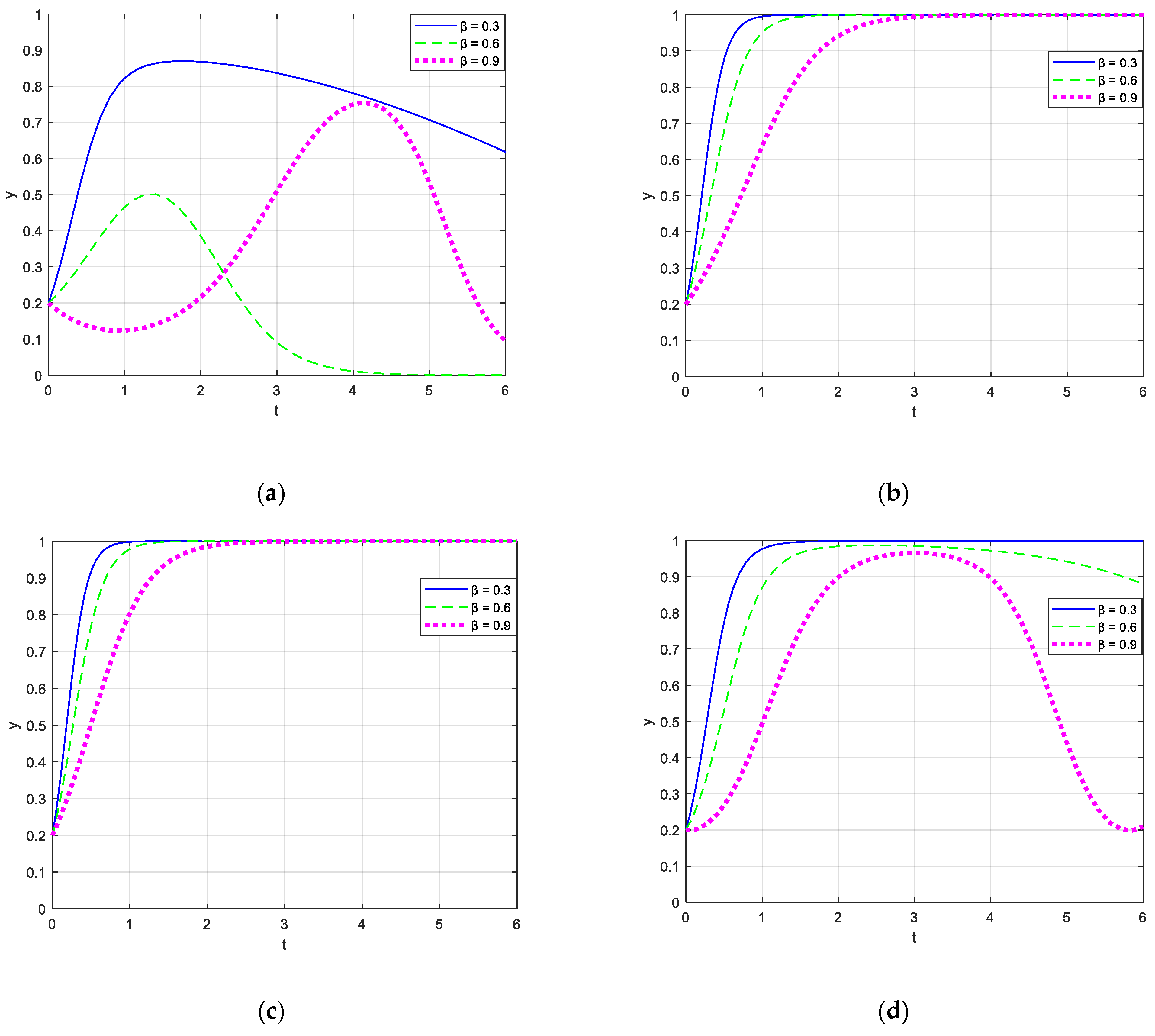
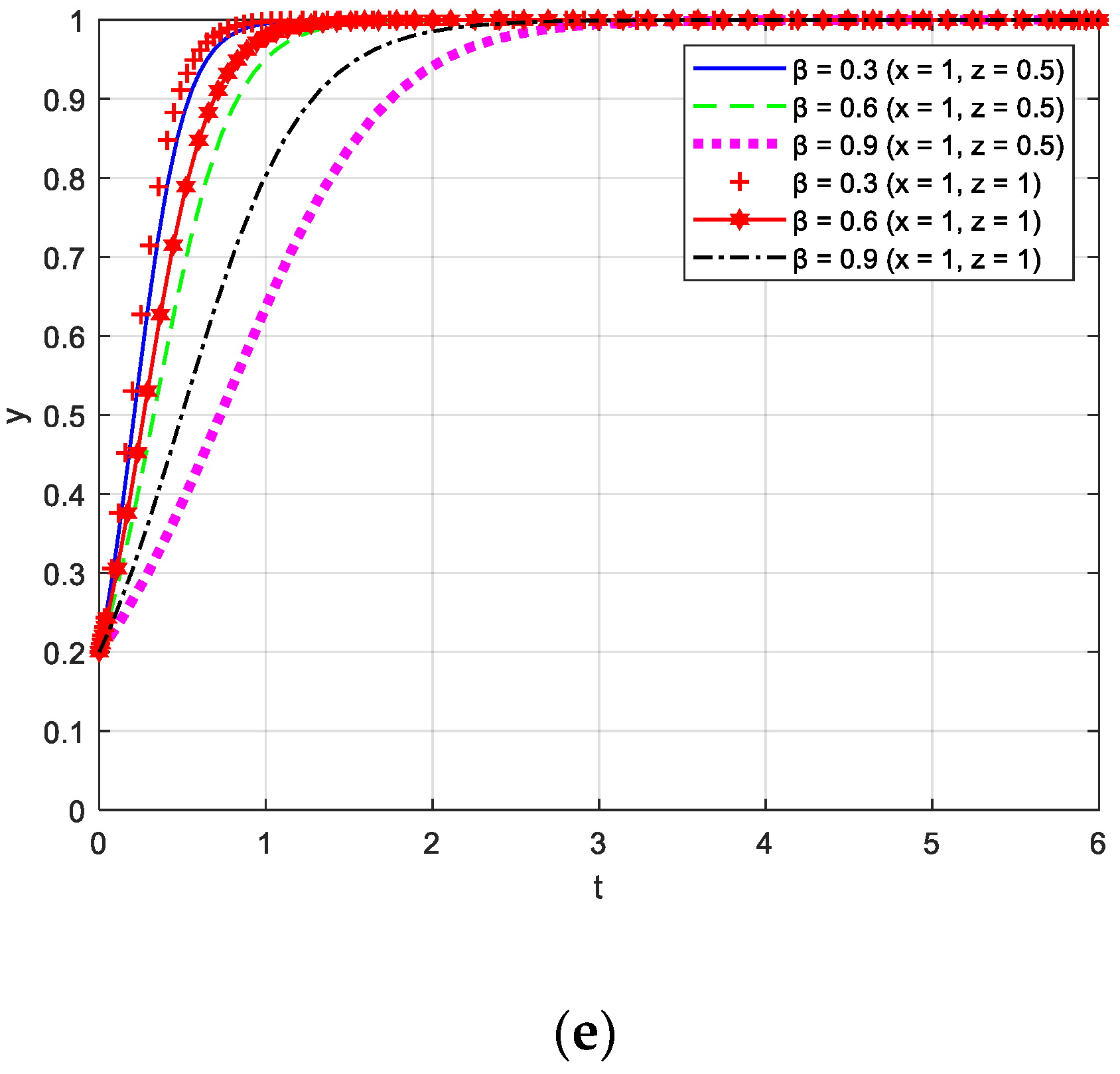
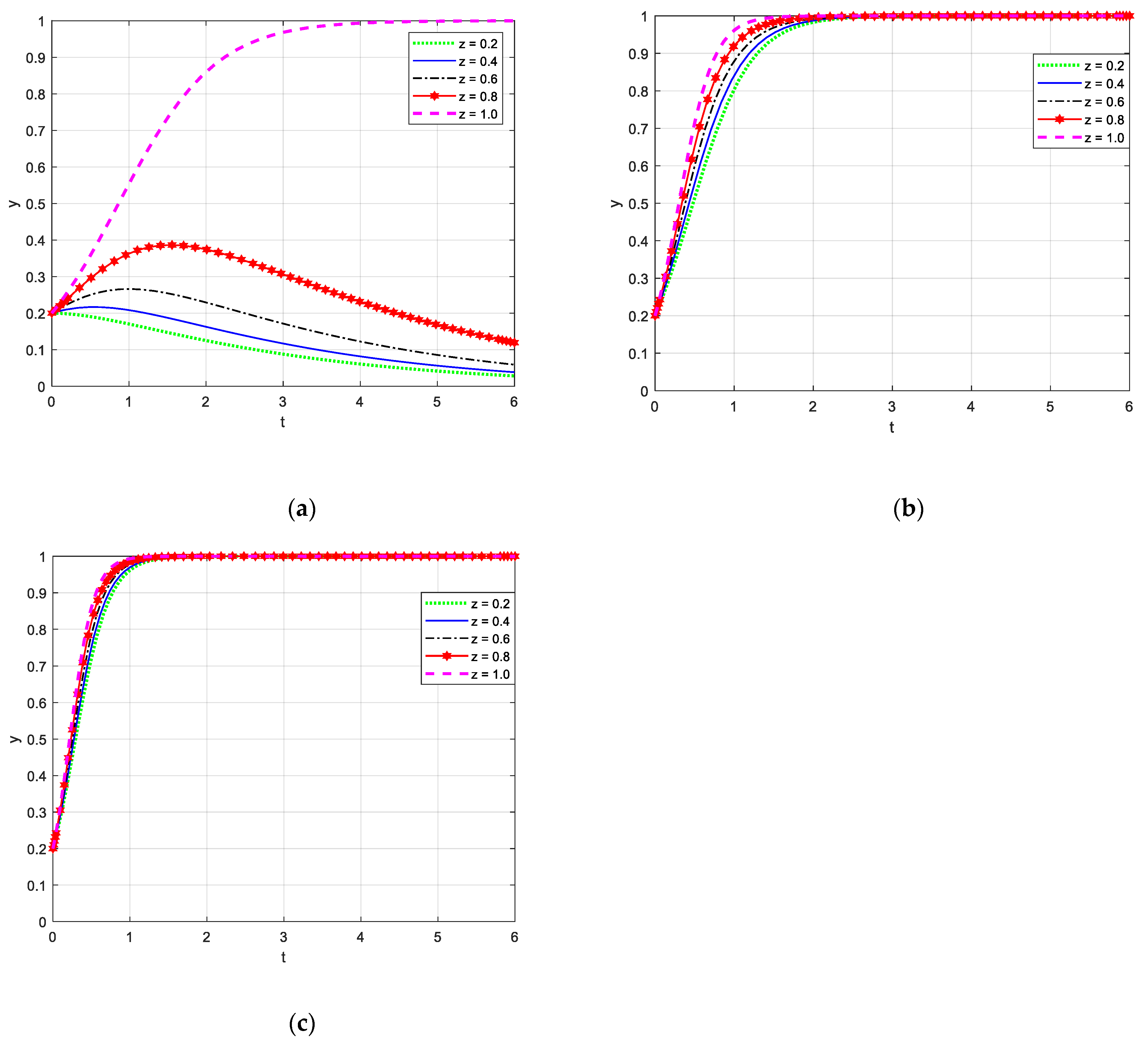
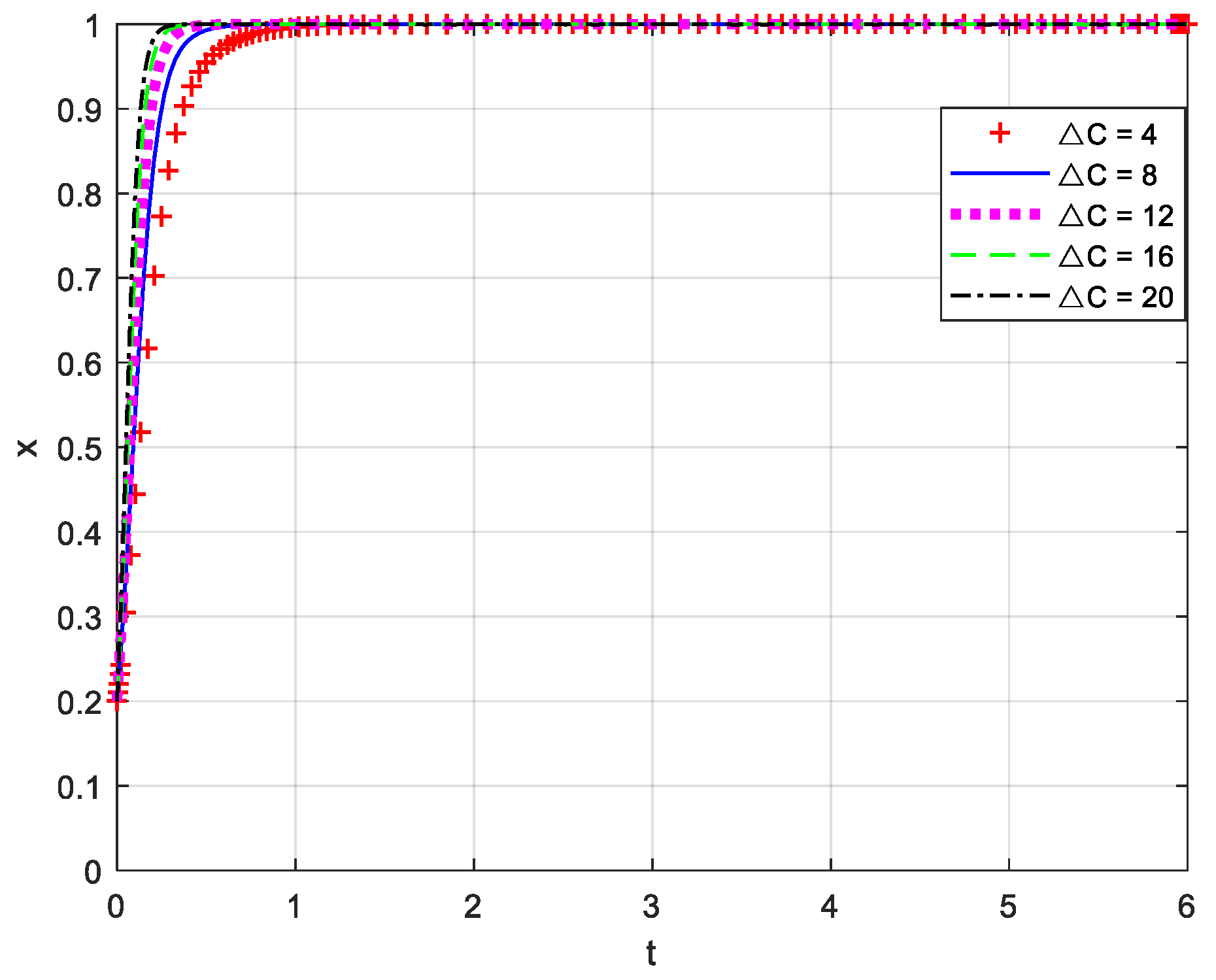
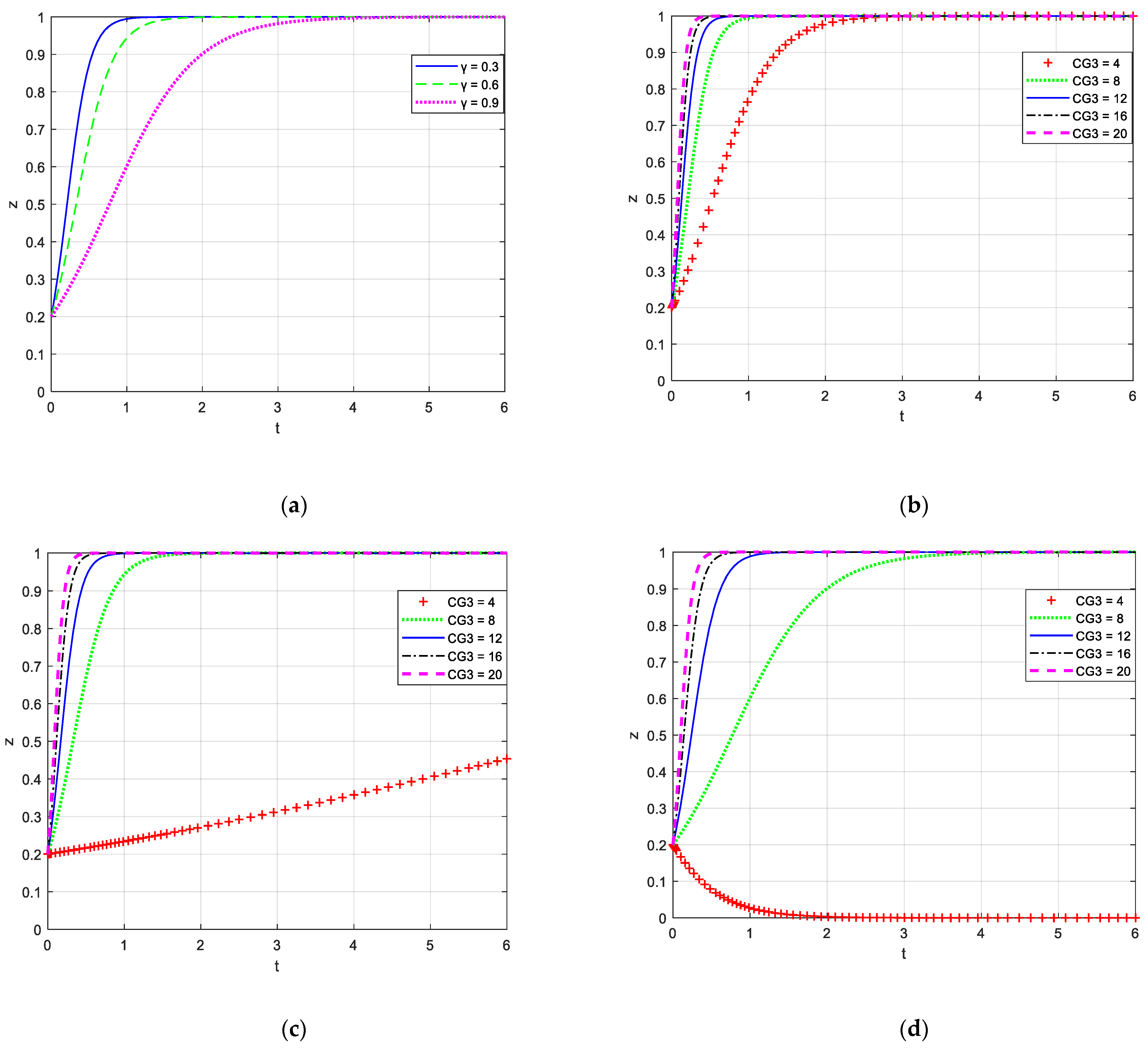
| Government and Logistics Enterprises | Environmental NGOs | ||
|---|---|---|---|
| “Non-Participation” | |||
| Government “reward-punishment” | Logistics enterprises “participation” | RG1 + RG2 − CG1 − CG2 − CG3 | RG1 − CG1 − CG2 |
| RE2 + CG2 − (1 + )CE1 | RE2 + CG2 − (1 + )CE1 | ||
| RS2 + CG3 − (1 + )CS1 | RS1 − CS1 | ||
| Logistics enterprises “non-participation” | RG2 + RG3 − CG1 − CG3 − CG4 | RG3 − CG1 − CG4 | |
| RE1 − CE1 − CE2 − ΔCE2 − RG3 | RE1 − CE1 − CE2 − RG3 | ||
| RS2 + CG3 − (1 + )CS1 | RS1 − CS1 | ||
| Government “no reward-punishment” | Logistics enterprises “participation” | RG1 − C | RG1 |
| RE2 − (1 + )CE1 | RE2 − (1 + )CE1 | ||
| RS2 − (1 + )CS1 | RS1 − CS1 | ||
| Logistics enterprises “non-participation” | − CG4 − C | − CG4 | |
| RE1 − CE1 − CE2 − CE2 | RE1 − CE1 − CE2 | ||
| RS2 − (1 + )CS1 | RS1 − CS1 | ||
| μ1 | μ2 | |
|---|---|---|
| x = 0, y = 0 | ||
| x = 0, y = 1 | ||
| x = 1, y = 0 | ||
| x = 1, y = 1 |
| h1 | h2 | |
|---|---|---|
| x = 0, z = 0 | ||
| x = 0, z = 1 | ||
| x = 1, z = 0 | ||
| x = 1, z = 1 |
Publisher’s Note: MDPI stays neutral with regard to jurisdictional claims in published maps and institutional affiliations. |
© 2022 by the authors. Licensee MDPI, Basel, Switzerland. This article is an open access article distributed under the terms and conditions of the Creative Commons Attribution (CC BY) license (https://creativecommons.org/licenses/by/4.0/).
Share and Cite
Luo, Y.; Zhang, Y.; Yang, L. How to Promote Logistics Enterprises to Participate in Reverse Emergency Logistics: A Tripartite Evolutionary Game Analysis. Sustainability 2022, 14, 12132. https://doi.org/10.3390/su141912132
Luo Y, Zhang Y, Yang L. How to Promote Logistics Enterprises to Participate in Reverse Emergency Logistics: A Tripartite Evolutionary Game Analysis. Sustainability. 2022; 14(19):12132. https://doi.org/10.3390/su141912132
Chicago/Turabian StyleLuo, Yumei, Yuke Zhang, and Lei Yang. 2022. "How to Promote Logistics Enterprises to Participate in Reverse Emergency Logistics: A Tripartite Evolutionary Game Analysis" Sustainability 14, no. 19: 12132. https://doi.org/10.3390/su141912132
APA StyleLuo, Y., Zhang, Y., & Yang, L. (2022). How to Promote Logistics Enterprises to Participate in Reverse Emergency Logistics: A Tripartite Evolutionary Game Analysis. Sustainability, 14(19), 12132. https://doi.org/10.3390/su141912132






